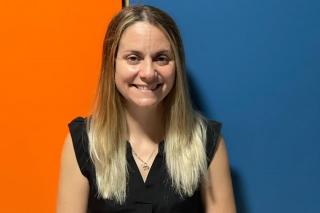The COVID-19 pandemic, among other issues, has created a shortage of Millennial and Generation Z nurses. Tanya Cohn, Associate Teaching Professor and Director of the DNP Program at Simmons School of Nursing, shares what can be done.
While shortages in nursing were already being discussed in pre-pandemic medical literature, the COVID-19 pandemic has accelerated this trend. According to Professor Tanya Cohn, the pandemic "has created a greater impact of burnout and compassion fatigue on nurses, and it has also made them reflect on the exhaustion of nursing and their undying desire to connect. They are being impacted physically, emotionally, mentally, and spiritually." For Cohn, these circumstances reveal the need to support wellbeing and self-care in the healthcare field.
As Cohn explains, younger generations of nurses, namely Millennials and Generation Z, are more reluctant to pursue nursing as a profession, as they are naturally attuned to issues of mental health. "I see many Simmons students today researching burnout and compassion fatigue," observes Cohn.
In order for younger nurses to be successful in the field, they must prioritize their mental health and wellness. For example, Kasie Cassell '23DNP, who is currently a psychiatric nurse practitioner, emphasizes that "you must take care of yourself, or else you won't be able to work at full capacity."
Cassell employs two strategies to protect her wellness. First, she gives extra support to her team when they are in crisis, and they support her when she is in crisis. Second, Cassell keeps both a work phone and a personal phone. Only her leadership team has access to the personal phone, and they are only allowed to contact her in the event of an emergency. This way, Cassell can put her work phone away in the evenings and focus on her family.
In a similar vein, TuQuyen Vo '22, a nurse at Mass General, carves out space to pursue hobbies and passions outside of work. "I also find talking to someone when I have a tough day makes a big difference in my personal wellness," she says. "I prioritize debriefing with friends in medicine, coworkers, and professional counselors."
Cecilia Motschenbacher '22DNP also has deliberately created a functional work-life balance. "To maintain wellness and combat burnout, I have found strength in reflection and gratitude as well as daily physical activity. This stems from my personal and professional experiences and is grounded in the sacred space I am honored to have in caring for the seriously ill to improve the quality of life for my patients and their families."
However, as Cohn indicates, one of the challenges facing young nurses today is working within an organizational culture that does not recognize their mental health needs. "We are losing this generation because they are not getting their wellbeing supported, as much as they need, in the workplace and it is very unfortunate," she says.
In her current research, Cohn has devised ways to engage and recruit young nurses. "You must be transparent, have a strong leadership philosophy, and lead by example," advises Cohn. "You need to be attuned to diversity and inclusion. These generations will put themselves out there if they know that the leadership is also engaged."
Moreover, employers should not make any promises that they cannot keep, as this reduces their transparency. "Be clear about the expectations and benefits, and make sure nurses are included in decision making. Nurses are more invested when they have a seat at the table, and this strengthens the organization overall," counsels Cohn.
The Simmons School of Nursing recognizes the unique needs of students who will comprise the next generation of nurses. "One of the things I love about Simmons is the culture," says Cohn, "whatever program you are in, the faculty see the students as the center." As she explains, Simmons is constantly assessing its courses to ensure that they embody diversity and inclusion. Moreover, students' research projects heighten their agency.
"At Simmons, we expand our own humanity from a student's standpoint. We care deeply about our students," says Cohn. "Nursing students are therefore enabled to have a seat at the table to better the clinic, the organization, and the community."

